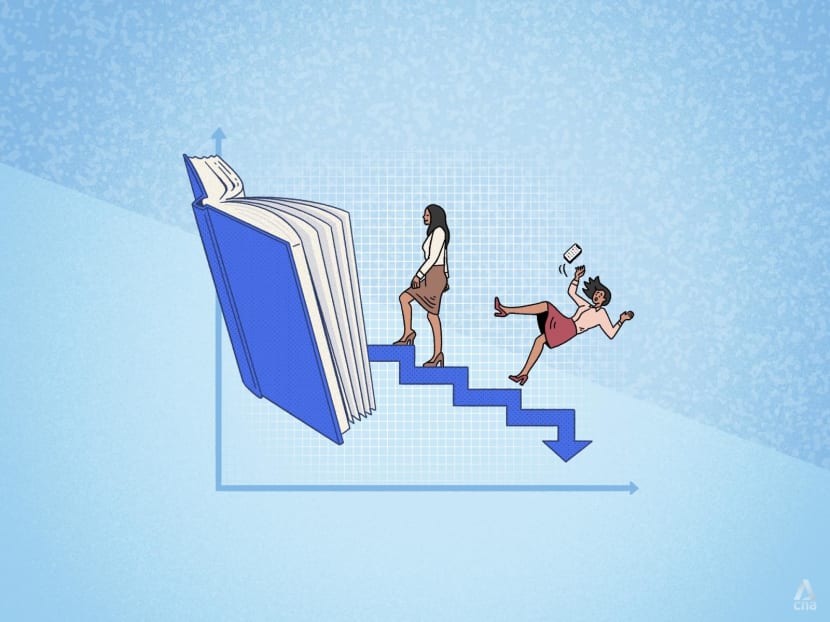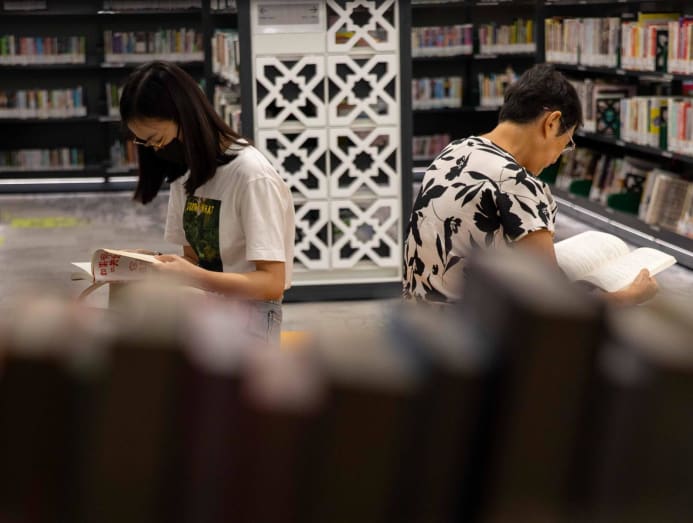- Joined
- Aug 29, 2008
- Messages
- 26,596
- Points
- 113
Singapore adults' ability to read or write in English is below OECD average. What's the problem?
Many jobs require strong reading, comprehension and problem-solving skills, and adults with lower literacy levels may struggle to adapt to new roles, reducing their employability, one expert said.
While a variety of factors are likely to blame for the decline in literacy among adults, one major reason is the rise of digital communication.(Illustration: CNA/ Nurjannah Suhaimi)

Eunice Sng
04 Jan 2025 09:30PM (Updated: 05 Jan 2025 02:20PM)
At work, Mr Ng Jing Feng has had to spend hours rewriting poorly worded reports produced by his colleagues.
As part of his role as a programme executive in the social services sector, Mr Ng edits many documents, such as incident reports and Standard Operating Procedure documents.
“Not using proper terms for incident reports resulted in confusion, causing staff to spend a lot of time clarifying things,” said the 41-year-old.
“Misunderstandings have happened when communication to our beneficiaries was not properly handled, requiring us to put in effort into damage control, and this has caused anxiety for our clients.”
Meanwhile, director in media and communications Fiona Smith sometimes receives proposal decks from vendors riddled with grammatical errors and spelling mistakes.
This made the companies look unprofessional, and as a result, made her more hesitant to hire them.
“We could still have asked them to present their ideas in person or over a video call, however this would not have been an effective use of time,” said Ms Smith, 42.
Their experiences reflect how poor communication, caused by substandard literacy skills, is a problem that is apparently all too common in Singapore.
A recent study by the Organisation for Economic Co-operation and Development's (OECD) Programme for the International Assessment of Adult Competencies (PIAAC) revealed that Singapore’s adult literacy proficiency is below the OECD average.
In Singapore, literacy in adults declines sharply after 35 years old, the study found, and the downward trend continues as adults age. Singaporean adults aged 55 to 65 are in 27th place – out of 31 countries – when it comes to literacy skills.
This stands in sharp contrast to the literacy skills demonstrated by Singaporean students. The country's 15-year-olds emerged as top performers for reading in the OECD's Programme for International Student Assessment 2022.
The implications of this trend – Singaporeans losing their literacy skills once they leave school – are far-reaching, experts said. For example, decreased literacy can limit individuals’ ability to meet the demands of increasingly complex workplaces, said Dr Annabel Chen from Nanyang Technological University (NTU).
“Many jobs require strong reading, comprehension and problem-solving skills, and adults with lower literacy levels may struggle to adapt to new roles, reducing their employability,” said the director of NTU’s Centre of Research and Development in Learning.
She added that adults with poor literacy could also struggle with understanding medical instructions, managing finances, or completing essential paperwork, leading to increased reliance on social support services which will strain the system.
Eventually, the trend might have ripple effects on future generations, as parents with lower literacy levels may struggle to effectively support their children’s education, perpetuating a cycle of limited literacy, said Dr Chen.
On the flip side, adults who have maintained their literacy skills by reading regularly say the benefits go far beyond simply being able to understand documents or medical instructions.
A senior director in the financial services sector, Ms Jasmine Gunaratnam, 40, said that reading fiction as well as non-fiction titles about history, politics and current affairs has granted her “the gift of understanding humanity”.
“Your general knowledge is better and it offers you insight to manage your work with others. Fiction helps you to appreciate the human condition too.
“It allows you to understand how psychology works, helping with relationship management and conflict resolution because you are exploring different perspectives all the time," she said.
Ms Angeline Ng, 44, a senior marketing manager, agreed that reading historical fiction helps her understand the history, politics and economics of different countries.
“My role involves Southeast Asia, India and other parts of Asia Pacific. So it does help me understand a little bit more of the cultures and personalities of the people I deal with (at work),” she said.
Public servant Yvonne Huang, 42, enjoys reading about climate change and foreign economies, which has not only enriched her knowledge of the world, but also helped her at work.
During meetings, she raises examples from overseas to share what Singaporeans can learn and apply from them.
“A good book can really open up your mind and show you new perspectives,” she said.

HOW THE OECD REPORT MEASURED LITERACY
The OECD study evaluated about 5,000 Singaporeans and permanent residents aged 16 to 65, using tests conducted in English to assess their literacy, numeracy and adaptive problem-solving skills.Singapore's score remained steady as compared with the last cycle of the study, remaining below the OECD average, but its ranking rose to 18th out of 31 countries, up from 28th out of 39 countries in the previous cycle.
The study defined literacy as the ability to access, understand, evaluate and reflect on written texts to achieve one’s goals, develop knowledge and participate in society.
The PIAAC reported results as averages on a 500-point scale. They split the continuum into six levels of proficiency, with “below Level 1” being the lowest and “Level 5” being the highest.
At below Level 1, adults are only able to read short, simple paragraphs. Those who fall within this category score between 0 and 175 points.
If the text is directing them to do tasks, these tasks only need understanding at the sentence level or across two simple adjacent sentences. The tasks are simple and explicit.
On the other hand, adults who are at Level 5 can read long and dense texts, and can possibly integrate information across multiple of such sources. They can synthesise similar and different perspectives and assess how reliable unfamiliar information sources are.
The results revealed that in Singapore, 30 per cent of adults scored only at Level 1 or below. This is a larger proportion than the OECD average of 26 per cent.
As was the case in all countries surveyed, the Singaporeans adults with a higher education scored better than those of lower education levels: Adults with tertiary education scored 48 points higher than those with upper secondary education, who in turn scored 59 points above those with less than upper secondary education.
But this pattern does not necessarily apply across borders. Tertiary-educated adults in Singapore scored lower for literacy than adults with only upper secondary education in Finland.
Men in Singapore scored an average of four points more than women.
Participants of the study took a "locator" test with eight literacy and eight numeracy questions on a tablet. This assessed their current proficiency levels.
They progressed to the actual test once they passed the locator test. The literacy test involved, for example, reading a passage and then evaluating whether certain statements related to the text are true.
WHAT IS CAUSING THIS DECLINE?
While a variety of factors are likely to blame for the decline in literacy among adults, one major reason is the rise of digital communication, Dr Chen said.As more of our daily communication comprises digital shorthand – including the use of emojis – as well as visual and multimedia formats, traditional reading and writing will naturally fall by the wayside.
“This reduced engagement with complex texts could contribute to skill atrophy over time, particularly for older workers who may not adapt as quickly to new literacy demands,” she said.
Associate Professor Loh Chin Ee, who researches literacy and literature education at the National Institute of Education, agreed, saying that increased time on social media may sometimes lead to more "skim and scan" practices.
Additionally, Dr Chen said that certain sectors place less emphasis on literacy-intensive tasks, focusing instead on technical or operational skills. This can reduce the frequency with which employees in such sectors engage in reading, contributing to skills decline.
But she pointed out that older cohorts of Singaporeans may have had different educational experiences, with fewer opportunities to build strong literacy foundations, compared with younger generations who have benefited from more recent educational reforms.
Singapore’s economic priorities often emphasise numeracy and technical competencies, too, she noted, and this might have shifted focus away from advanced literacy development in certain workforce segments.
